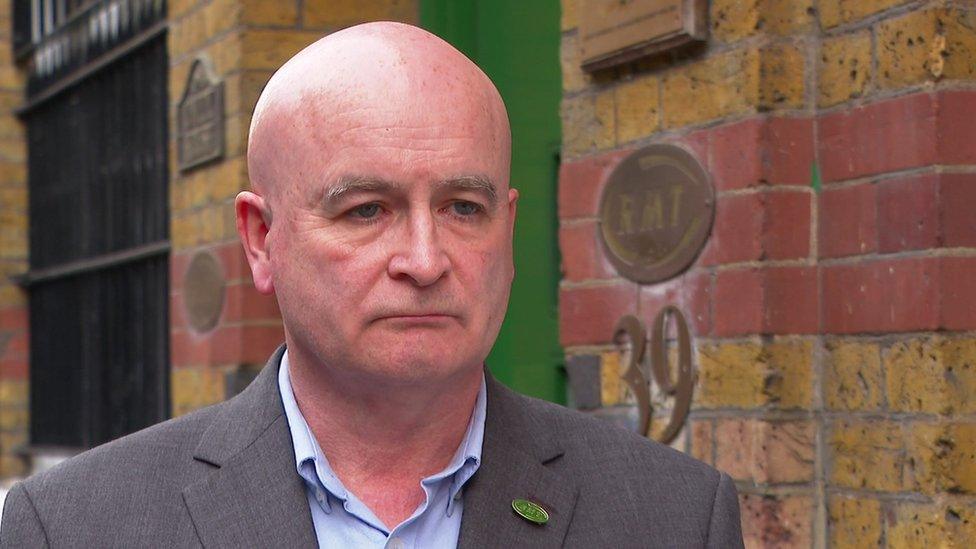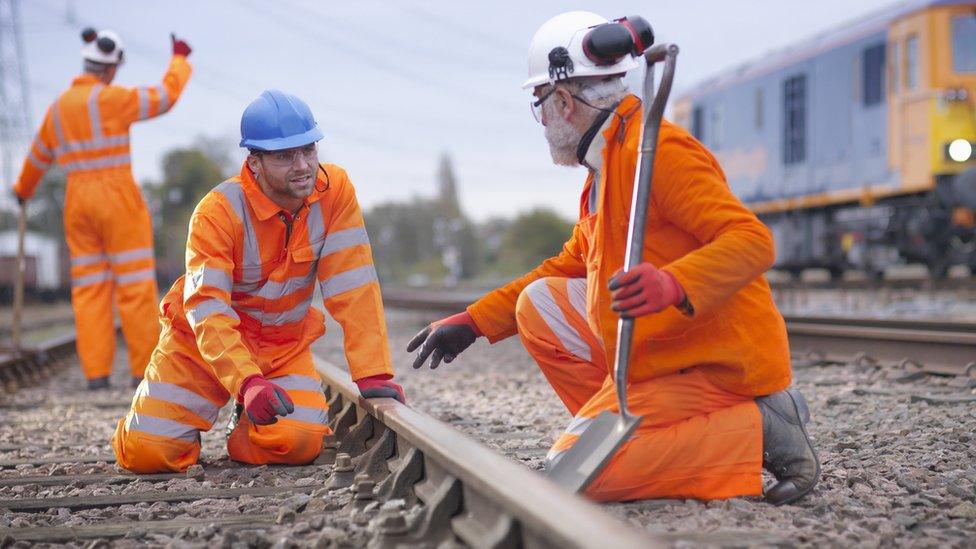Hospitality firms warn June rail strikes will be devastating
- Published

National rail strikes will have a devastating impact on the theatre, live music and hospitality industries recovering from the Covid pandemic, trade bodies have warned.
Thousands of workers are set to walk out on 21, 23 and 25 June after talks over pay and redundancies failed.
The RMT Union said the action will shut down the country's railways, causing major disruption for passengers.
The union and rail firms have criticised each other.
If industrial action goes ahead, more than 40,000 staff from Network Rail and 13 train operators are expected to take part in what is dubbed the "biggest rail strike in modern history".
But in a joint statement from bodies representing hospitality businesses, theatres, live music venues, and museums, leaders said a strike would be "hugely damaging" and felt "counterintuitive when we are facing so many other challenges".
"Our night time economy relies heavily on the rail network to bring our audiences and staff safely to and from our venues, with 81% of London theatregoers using public transport and a similar proportion of hospitality customers," they said.
"We urge all stakeholders to come together to support a recovery that we can all benefit from."
The strikes fall at a time when several music and sporting events, including the Glastonbury Festival and an England cricket Test match against New Zealand, are taking place, many for the first time without Covid restrictions since the pandemic began.
Both train operators and the union have said they want more talks to avoid the strikes.
Downing Street said the union was being "selfish" and warned the plans would inflict pain on passengers during "really tough times".
However, the RMT hit back at Downing Street's comments calling the union "thoroughly irresponsible", saying the government itself was both selfish and irresponsible.
On the first day of the planned strike on 21 June, London Underground RMT workers and Unite members working for the underground and Transport for London, all plan to walk out in a separate dispute over pensions and job losses.
The strikes will leave around a fifth of mainline rail services running on the strike days, but due to each walk out being 24 hours long, disruption is expected to spill over to non-strike days, leading to a week of disruption.
Michael Kill, chief executive of the Night Time Industries Association, which represents night clubs, bars and festivals, said the strike announcement had sent a "shockwave throughout the industry".
It said businesses had concerns for staff and public safety, as well as the potential impact on trade.
"Limited Rail services across the UK will leave many stranded at night, compromising safety with very few alternative transport services available," Mr Kill said.

Mick Lynch, RMT general secretary, said rail firms had not made concrete proposals on pay
However, Mike Lynch general secretary of RMT, has said the union doesn't want disruption for thousands of commuters and said there was "plenty of time to get proposals forward".
Mr Lynch told the BBC railway firms "can easily afford a pay rise for our members" by cutting back on their profits, a claim which the Rail Delivery Group, which represents train operators, disputed.
According to the Department for Transport, the average salary rail worker salary is £44,000, which is more than the median pay of other public sector workers, such as nurses (£31,000), teachers (£37,000), and care workers (£17,000).
However, RMT said the salary figure was "unrepresentative" as it included higher-earning train drivers, who did not take part in the ballot as most are part of a different union. The union claims its members earn £33,000 a year on average.

Which lines will be affected by the strike?
People working for 13 train operating companies, which each run services in different parts, external of the country, will take part in the strike. These are:
Chiltern Railways
Cross Country Trains
Greater Anglia
LNER
East Midlands Railway
c2c
Great Western Railway
Northern Trains
South Eastern Railway
South Western Railway
TransPennine Express
Avanti West Coast
West Midlands Trains
In addition, workers at Network Rail, which maintains the railways throughout Britain, also voted to strike. So the impact of the action would be felt across England, Scotland, and Wales.


How will you be affected by the planned rail strikes? Tell us by emailing: haveyoursay@bbc.co.uk, external
Please include a contact number if you are willing to speak to a BBC journalist. You can also get in touch in the following ways:
WhatsApp: +44 7756 165803, external
Tweet: @BBC_HaveYourSay, external
Or fill out the form below
Please read our terms & conditions and privacy policy
If you are reading this page and can't see the form you will need to visit the mobile version of the BBC website to submit your question or comment or you can email us at HaveYourSay@bbc.co.uk, external. Please include your name, age and location with any submission.

Related topics
- Published7 June 2022

- Published9 May 2024
